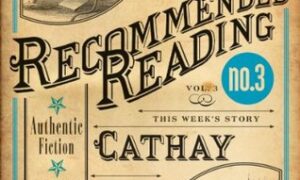 Knives in Hens by David Harrower
Knives in Hens by David Harrower
My rating: 3/5 cats



i don’t read a lot of plays. but i came across a couple that piqued my interest while toiling at the book factory, and decided to give them a try. this one called to me because of the title, obviously, but also the part of the synopsis describing it as a brutal fable set in a timeless rural community. i LOVE brutal fables set in timeless rural communities! and so while the rest of the synopsis, about the transformative power of knowledge and an emerging consciousness as the world moves from rural to the urban and industrial struck me as a bit pretentious, i decided to read it anyway.
it was not my favorite.
i kind of knew i was in trouble from the very first batch of dialogue:
Young Woman I’m not a field. How’m I a field? What’s a field? Flat. Wet. Black with rain. I’m no field.
William Never said that.
Young Woman Says I’m a field sitting here.
William Said you’re like a field.
Young Woman Said I’m a field sitting here.
William Said you’re like a field. Like a field.
Young Woman ‘S the same.
William Nothing close, woman.
Young Woman If I’m like a field must be a field.
William Don’t have to be a thing to be like it.
Young Woman How?
William Just don’t.
Young Woman ‘M I other things? Fire?
William I got mud for feet. Can’t feel them.
etc etc.
i mean, that makes david mamet’s dialogue seem naturalistic and verbose. ooooh, burn.
apart from the stilted dialogue, and the shades of beckett in this WTF opening exchange, the play is overall very stark and porous. things definitely happen, but it’s hard to say why they happen. there’s a murder, and the motive for that is clear, but smaller situations are as obscure as can be. to me. although maybe not just to me, as the first line of the introduction is:
If you think Knives in Hens is mysterious, elliptical, and strange, don’t worry: you are not alone.
which is all well and good for my readerly self-esteem, but i’m no more comfortable being bored and confused in a crowd than i am when standing alone, so that’s not really a consolation. i’m no stranger to close reading and filling in the blanks when it comes to purposefully ambiguous texts—i did my time in undergrad english major land, learning all the theory, making all the critical assessments, dissecting all the texts and examining them through all the various filters, but there’s such a thing as too much ambiguity, where you find yourself scrutinizing every word for meaning, pawing through the gristle n’ bone sparseness of a text and left with nothing but shreds for your troubles.
i’ve never been big on reader-response criticism—it always seemed like slippery hippie shit to me. if an author’s intentions are meaningless, why read at all? it smacks of lazy ‘everyone gets a medal’ indulgence and allows idiots to be critical kings for a day. so, when i read further into the introduction (after reading the play, obviously) and came across this, it irritated me:
Even looking thematically, we end up with suggestions rather than definitive explanations. The play’s global popularity is thanks to its capacity to be interpreted in so many different ways. A feminist could see it as the story of a woman who travels from ignorance to political consciousness. A humanist could see it as a metaphor for a society waking up to its own potential. The politically minded could regard it as a vision of a people moving from enslavement to liberation. A supporter of the arts could see it as the crucial evolutionary step from the literal to the imaginative. A Freudian could interpret it in terms of dark sexual stirrings as we try to reconcile our brute animal side with our refined intellectual side. A religious philosopher could recognise it as a journey from God-fearing indoctrination to original thought. A self-help guru could see it in terms of self-knowledge and personal fulfilment. A folklorist could identify the archetypal forces at play, identifying the Young Woman as a Cinderella figure who makes the rags-to-riches transition from servitude to freedom. A historian could see it as the story of the age of superstition turning into the age of enlightenment. McMillan saw it as the transition from ‘a world driven by muscle power and simple implements to one driven by language and technology.’ I could go on.
and that’s the problem—he probably could. but what’s the fucking point?
apparently this play was a Very Big Deal in the world of scottish theater (or ‘theatre’) in the 1990’s, revitalizing the possibilities of the performative arts and taking the (theater) world by storm. and for that, i say “well done, david harrower!”
but for me, it was merely medium-okay.
read my book reviews on goodreads







